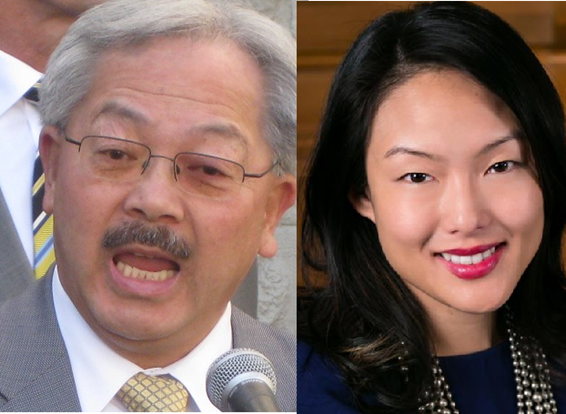
Mayor Ed Lee and Sup. Jane Kim: Very different visions of housing in SF
By Tim Redmond
Mayor Ed Lee has responded to Sup. Jane Kim’s affordable housing proposal with a competing measure that would actually make things worse than they are now.
The mayor likes to talk about consensus and the Chron calls his proposal a “compromise,” but I’ve read the housing measure he’s put forward, and instead of any requirements or rules around the construction of new affordable housing, the measure essentially blocks all challenges to luxury housing projects – with tenants and neighborhood advocates getting nothing in return.
It’s as if Lee has decided that the private market should operate unfettered, while Kim is offering reasonable (actually, fairly moderate) regulations that fit into the concept of traditional city planning.
The two visions are critically important now that there’s a chance that Ellis Act reform is dead at the state level. The mayor has repeatedly put his hopes for controlling evictions and preserving housing diversity on Sacramento and Sen. Mark Leno’s Ellis Act bill. Without that, the city will have to look to local solutions – and Kim’s bill, along with an anti-speculation measure taking shape, are both efforts to use the city’s own authority to set housing policy.
The Lee measure, called “Build Housing Now,” is everything condo developers could ask for. It specifically states that the city can’t adopt any rules to limit or delay new housing (of any sort) in any neighborhood that is part of an Area Plan (that means most of the Eastern part of the city where so much of the new high-end housing is going). That means no design review rules, no new affordable housing mandates – and “no regulation that could prohibit, condition, or otherwise restrict the approval of new market-rate housing units based on a cumulative housing balance ratio or other criteria related to achieving or maintaining a certain ratio of various types of affordability levels of housing on a district-wide or city-wide basis.”
Think about that: The mayor, who talks about the need for affordable housing, wants to ban any efforts to force developers to build more affordable housing.
The measure has some high-sounding language at the beginning, starting with an admission that San Francisco’s tech-driven employment boom has been something of a problem: Between 2007 and 2013, the city saw 51,800 new jobs, and 14,060 new housing units.
Then it goes on to state that the mayor’s proposal to build 30,000 new units by 2020 would “likely curb the price escalation that has resulted” from the housing shortage. But there’s no evidence that building more high-end housing will bring down prices for the rest of us; it never has.
The measure also states that “a majority” of the new units will be “within financial reach of middle-income households.” Since the media price for new one-bedroom condos is well about $750,000, and two people buying that unit with five percent down would be paying $4,200 a month in mortgage and property taxes, or his definition of “middle-income” is something of a stretch. Two people would need a combined income of more than $140,000 a year to afford that one-bedroom unit, which means they don’t have kids; the median household income in San Francisco is about half of that, according to the US Census.
And there is absolutely nothing in the mayor’s proposal that in any way provides new revenue or mandates higher affordability. It’s a joke: the closest it comes is a meaningless statement about the need to seek new funding sources.
You can argue that Kim’s measure, which exempts smaller projects and buildings already in the pipeline, should be stronger; in the past, activists have called for a moratorium on luxury housing until the city meets affordability goals. But apparently a moratorium won’t hold up legally, and this legislation would be the first ever to specifically say that if the city can’t meet it’s goals for housing low and moderate-income people, it can’t keep building for the rich.
And the mayor is saying that’s unreasonable. Not hard to see who’s side he’s on in this debate.
UPDATE: Leno called this afternoon to say he was “very disappointed” in the vote. While he has the opportunity to bring the bill back for reconsideration, that’s unlikely right now, since the deadline for policy committees to report out bills is the end of next week, and the Housing and Community Development Committee doesn’t meet again until after that deadline. It would take a rules waiver, a special meeting, and at least one member agreeing to change his or her vote.
“But we have raised awareness of this issue, and we can look at bringing it back next year,” said Leno, who has often had to introduce bills multiple times but rarely gives up on an important cause. Like this one.






